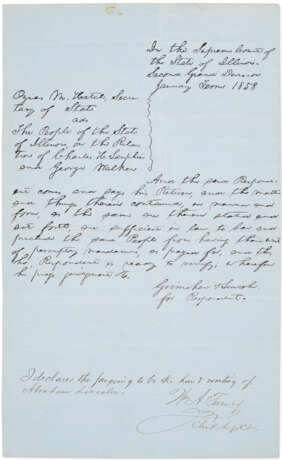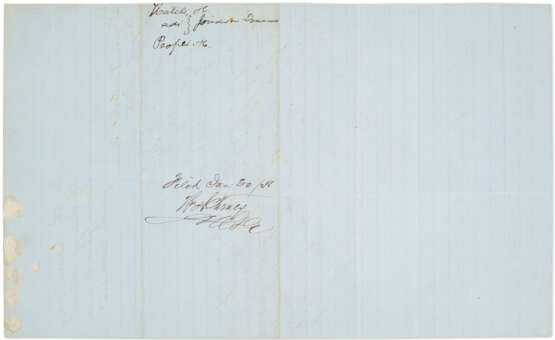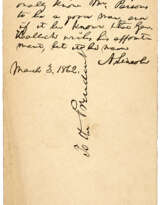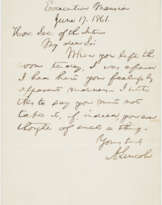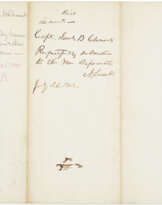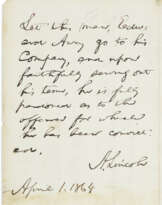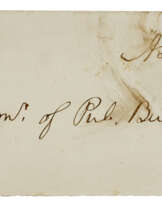ID 1360915
Lot 198 | Representing the Illinois Secretary of State
Estimate value
$ 7 000 – 10 000
One page, 192 x 327mm. (light folds, some adhesive remnants on the verso, one small stain at top edge.)
After a Republican Governor mistakenly signs, then promptly vetoes, a redistricting bill, Lincoln represents the Illinois Secretary of State against the Democratic legislature's writ of mandamus.
In 1857, the Illinois General Assembly passed a bill which created representative districts and apportioned the representation to the General Assembly. Despite his opposition, Republican Governor William H. Bissell inadvertently signed the bill, and his private secretary reported to the legislature that the Governor had approved it. Later, Governor Bissell realized his mistake, scratched out his name, and vetoed the bill. The Democrats wanted to test the validity of Bissell's veto, since the Governor erased his signature after his secretary had already announced the passage of the bill. The People, on the relation of the state printers Lanphier and Walker, sued Hatch, the secretary of state and record-keeper of the laws, for a writ of mandamus to compel him to furnish a true copy of the apportionment bill for printing. Hatch retained Lincoln, who insists here that Hatch’s return is "sufficient in law to bar and preclude the said People from having their writ of peremptory mandamus". The state Supreme Court would later agree and deny the People’s motion, ruling that the secretary’s announcement was only a formal courtesy and that the governor could withdraw his signature as long as he had control of the bill.
The lower portion bears a confirmation of Lincoln's handwriting by William A. TURNEY (1832-1875), the Illinois Supreme Court Clerk who originally filed the paperwork on January 30, 1858 (as indicated by his docket on the verso). Turney would later serve as the 1860 delegate to and secretary for the Democratic Party convention in Sangamon County, Illinois. During the Civil War, he served as a private in Company C of the First Illinois U.S. Cavalry from July 1861 until his discharge in March 1862.
| Artist: | Abraham Lincoln (1809 - 1865) |
|---|---|
| Auction house category: | Letters, documents and manuscripts |
| Artist: | Abraham Lincoln (1809 - 1865) |
|---|---|
| Auction house category: | Letters, documents and manuscripts |
| Address of auction |
CHRISTIE'S 20 Rockefeller Plaza 10020 New York USA | ||||||||||||||
|---|---|---|---|---|---|---|---|---|---|---|---|---|---|---|---|
| Preview |
| ||||||||||||||
| Phone | +1 212 636 2000 | ||||||||||||||
| Fax | +1 212 636 4930 | ||||||||||||||
| Conditions of purchase | Conditions of purchase | ||||||||||||||
| Shipping |
Postal service Courier service pickup by yourself | ||||||||||||||
| Payment methods |
Wire Transfer | ||||||||||||||
| Business hours | Business hours
|
